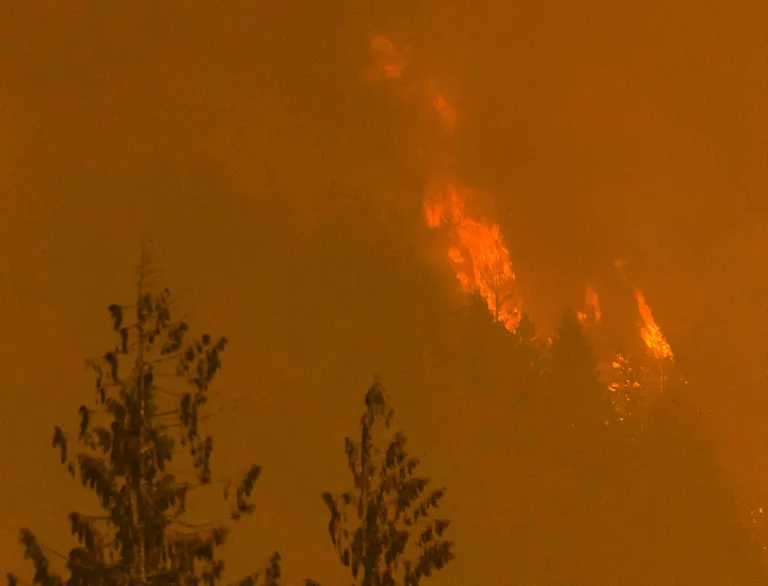As temperatures soar across Washington this week, so too will the risk of wildfire, state officials say.
The hot weather (expected to hit triple digits in some places), ongoing drought and heavy gusts of wind form the three pillars of what is expected to be “near record” wildfire danger, according to the Northwest Interagency Coordination Center’s Monday morning briefing.
Risk will be at its highest on Wednesday for the area east of the Cascade Crest, stretching toward the Idaho border, the center’s analysis shows. The National Weather Service issued a fire watch through that evening for portions of Asotin, Columbia, Garfield and Walla Walla counties, citing the dry and unstable conditions.
“It is essentially the perfect weather recipe not only to spark wildland fires but, after a potential ignition, to expand them,” said Ryan Rodruck, communications manager with the state Department of Natural Resources.
And the vast majority of wildfires are sparked by people — as seen Saturday when pyrotechnics from an ODESZA concert at The Gorge Amphitheatre started a small brush fire near the stage. That fire was extinguished quickly and nobody was hurt, but similar events could grow out of control.
A heat wave is cooking the entire West Coast and it’s expected to continue through the week as a high-pressure system lingers over the region. As the weather system passes through, dry and gusty winds are expected to follow, particularly east of the Cascade Mountains, the morning brief says.
These hot conditions quickly dry out lighter plants like grass and sage brush, which act as easy starter fuels, Rodruck said. Risk brought on by the heat is compounded by a lack of moisture.
Washington saw below-normal snowpack this winter and started off the summer on a dry foot; from there drought conditions deepened.
More than 75% of Washington is considered abnormally dry, a quarter of the state suffers from “moderate” drought and more than 6% of the state is considered to be in “severe” drought, according to the U.S. Drought Monitor.
While many expected a hotter-than-average winter thanks to El Niño conditions, global warming brought on by human’s burning fossil fuels exacerbates those conditions. Some climate models predict snowpack droughts — like the one this winter — in as much as 40% of the years going forward.
Winds of up to 15 mph can be expected across the state as well, as the high pressure system over the West Coast moves east, said Logan Howard, a meteorologist with the National Weather Service in Seattle.
Those gusts are expected to be ocean winds, Howard said, rather than the easterly winds that can elevate fire risk even more.
State officials began staging people and equipment across the state this spring so they’re in position to respond to reported fires as quickly as possible.
Airplanes, which can drop fire retardants on fires, sit ready at runways in Olympia, Spokane and Yakima, among other places, Rodruck said.
“We have local units in every corner of the state,” he said.
Those units need the help of people across the state, however, Rodruck said. Something like 90% of wildfires are human-caused and, therefore, preventable.
Campfires and fireworks are on the list of causes but even higher are actions as simple as dragging a chain behind a recreational vehicle, or parking your car in grass, Rodruck said. Sparks from the chain or a hot muffler are more than enough to start a fire.
Hikers and campers should also check conditions before they head out to be sure they won’t run into an active wildfire, Rodruck said.
At least three wildfires are actively burning in Washington, the largest of which is the Pioneer fire along Lake Chelan, which now covers an estimated 10,000 acres and has prompted a series of evacuation orders. The Basalm Root fire near Wenatchee covers over 300 acres and the Thorp Road fire south of Yakima covers about 2,000 acres.
Two others are burning in Oregon. The McCaffery fire, near Bend, prompted an evacuation order over the weekend, The Oregonian reported, though the warning level was lowered Monday after firefighters contained more of the blaze.
The small fire at The Gorge was particularly unexpected for Robbie Montgomery, who said he was lying in the field, listening to the show and staring at the stars before someone started screaming. He said he jumped up and ran toward the fire, using his hoodie, shirt and hands to try and tamp down the flames with another concertgoer before the firefighters arrived.
The ordeal was frightening, Montgomery said, describing his singed hair and burned clothes. But it was also invigorating and has given him a new appreciation for the work firefighters do. Now he plans to explore firefighting as a career path.
